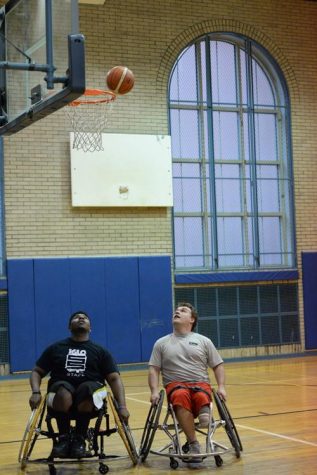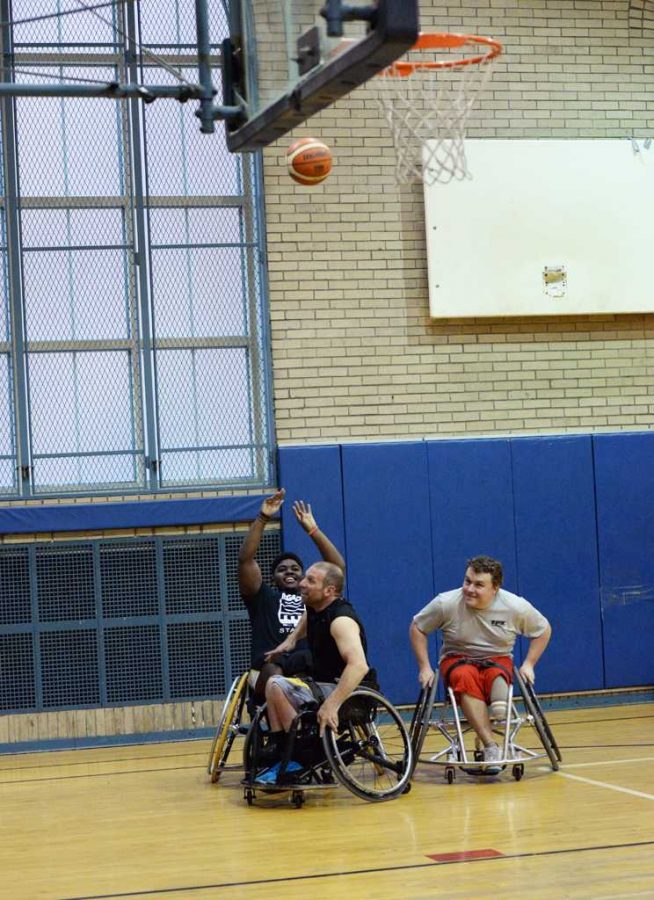If you missed Dan McCoy gliding to victory with the U.S. Men’s Sled Hockey Team at the 2014 Paralympics in Sochi, Russia, you can catch him training at the Petersen Events Center twice a week.
McCoy has spina bifida, which is the improper development of the spinal cord. He’s one of many athletes with disabilities who uses equipment in the Pete to train, or swim in Trees Hall. If other students with disabilities want to play a competitive sport, they have to make like McCoy and join local or national teams not affiliated with the University — at least, for now.
Starting in fall 2016, Pitt will become one of only about 14 schools nationwide offering an adaptive sports program, meaning athletes with disabilities can compete against other schools.
According to Jonathan Duvall, founder of the Students for Disability Advocacy group at Pitt, students with disabilities started asking for adaptive programs just under two years ago.
Title IX means that all students are supposed to have the opportunity to try out for sports at all levels, but it’s not mandatory that a university specifically offers adaptive sports. Schools have to take the initiative on their own, which usually means that enough students have to show an interest in joining them before they can consider funding them.
The program at Pitt will be open to students with and without disabilities who want to play wheelchair basketball or power soccer, a four-on-four version of soccer played in a gymnasium on a regulation basketball court by teams of power wheelchair-users. The teams will practice once per week and alternate between sports during a five-hour slot.
Wheelchair basketball requires specialized chairs with modifications, including angled wheels and strap-in seats, designed to keep up with the vigor of the sport. The average cost for one of these chairs can range from $1,000 to $1,999, depending on its condition.
According to Sam Vescovi, Pitt’s assistant director of operations for Intramurals and Recreation, the University is currently talking to nonprofit organizations willing to pay for equipment. Vescovi said Pitt is willing to take chairs in any condition and repair them.
The University also plans to borrow chairs from the SteelWheelers, a local adaptive sports organization that stores its chairs in Bellefield Hall after practice, as Pitt will also hold its wheelchair basketball and power soccer practices there.
Power soccer is specifically meant for people who have limited functionality in their muscles from disabilities like quadriplegia, multiple sclerosis and muscular dystrophy. The sport requires extra guards — that cost around $500 — attached to the bottom of an automated wheelchair to guide the ball.
Vescovi said he will eventually expand the wheelchair basketball and power soccer to a competitive level, but the focus for the first year is on establishing club and intramural teams.
Right now, students with disabilities are limited to fitness benefits, like trainers that work pro bono to develop a routine that best works for them.
This ranges from training with accessible equipment in the Baierl Student Recreation Center to having the personal trainer work with a student in their dorm room.
“We don’t have the most handicap-accessible equipment,” Vescovi said, “but we do the best with what we have.”
Accessible equipment has removable seats that allow a wheelchair to fit in their place and wrist guards for students who have difficulty holding on to the equipment because of muscle impairment.
To plan for a competitive sports environment for students with disabilities, Vescovi and other members of Pitt’s Intramurals and Recreation contacted other universities and competitive leagues to figure out what resources and finances they would need to get the program started.
Vescovi said Pitt’s Intramurals and Recreation department is in close correspondence with Edinboro University about its adaptive sports program. The department has also talked to the Eastern College Athletic Conference about how to have athletes with disabilities compete on the same level as varsity athletes.
Edinboro, in Erie, Pennsylvania, started its wheelchair basketball team in 1985. It used to have both a men’s and women’s team, but after budget cuts, the university now has a competitive men’s team that competes in the National Wheelchair Basketball Association.
Jim Glatch, head coach of wheelchair basketball at Edinboro and 1987 Pitt alumnus, said the men’s team started to play in the NWBA’s intercollegiate men’s division in 1996, a year after he started coaching.
“[Edinboro] became well known for having an expertise in disability. This attracted students with disabilities to come to the school,” Glatch said. “I started recruiting players so we could be a more competitive team against other schools in our division.”
Although the athletes play competitively against other schools in the NWBA, they aren’t necessarily part of their respective schools’ athletic department. Edinboro is one of only two schools to include adaptive sports in the department.
Unlike the ACC and the ECAC, the NWBA is private and the only sport it includes is basketball, so the NCAA doesn’t recognize it as an official conference.

A Pittsburgh-based adaptive sports organization, the SteelWheelers compete as a Division III NWBA team — one of the non-intercollegiate divisions.
The SteelWheelers, formed in 1978 for veterans after the Vietnam War, include a wheelchair basketball team, a rugby team and a hand cycling team.
Marshall Lee Tempest said the University is ready for an adaptive program based on the local clubs sprouting up in Pittsburgh. Tempest, a basketball coach and player for the SteelWheelers, will step down from his position in the fall to help establish the school’s program in Oakland.
“People in the [Pittsburgh] community are becoming more aware of adaptive sports. It’s trending,” Tempest said.
Although adaptive sports programs are rare in college, ECAC Senior Adviser Ted Fay said Pitt has the potential to influence a change.
“We want Pitt to be an exemplar program for other schools,” Fay said. “The timing of Pitt’s interest could not be more fortuitous.”
In the fall of 2015, the ECAC became the first collegiate athletic conference to offer NCAA-sanctioned events and varsity-level competition in adaptive sports.
Fay said the ECAC is also adding adaptive-specific events to championship sports, including track and field and rowing.
Glatch said it’s important that schools recognize how important varsity sports are for some students.
“As much as our players are varsity athletes, they are students first,” Glatch said. “It’s important that students get a chance to go to any school they want and play the sport that they want.”
In the meantime, McCoy will keep practicing. As he takes classes part time in order to keep up with his training, he might be here to see an official Pitt-sponsored adaptive sports team.
“I know a few guys from my sled hockey club who are planning to come to Pitt,” McCoy said. “And it would be amazing if we could one day compete wearing a University of Pittsburgh jersey.”


